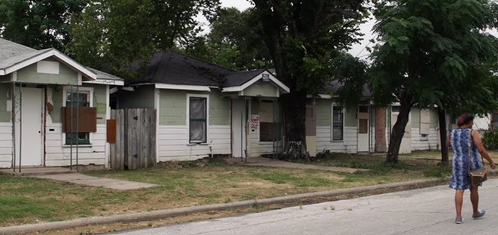Photo: YouTube
WASHINGTON, D.C. – As the nation struggles to dismantle the institutional racism that has undermined wealth generation in Black families, the National Association of Real Estate Brokers (NAREB) today released its 2022 State of Housing in Black America (SHIBA) Report. It provides a comprehensive analysis of Black homeownership and the historic barriers Blacks face when seeking to purchase a home and gaining wealth.
For the first time, the SHIBA report, which was released at NAREB’s annual Black Wealth Summit in Washington, D.C., includes assessments of the impact that natural disasters, climate change, toxic facilities and inland flooding have had on Black families. The report notes the devastation caused to in places like New Orleans LA, Jackson MS and Flint MI.
“We often think of wealth in terms of cash, investments and even Bitcoin, but wealth is also found in the water we drink, the air we breathe and the land on which we live,” says NAREB President Lydia Pope. “It is the sacred duty of community leaders, policy makers and financial industry specialists to lift communities so that all children can thrive and grow up with opportunities for good health, wealth and happiness in their lives.”
Moreover, the report states: “Race has historically been the main determinant of the placement of toxic facilities in the United States. And decades of redlining and segregation has ensured that Black inner-city communities are home to some of the most deteriorated infrastructure in the nation. Black communities are on the front lines of climate change as a lack of resources and outdated housing stock and infrastructure…make them more vulnerable to the adverse effects of extreme weather and climate change.”
The 2022 SHIBA report outlines the status of Black homeownership and the broad challenges that Black families and individuals face when they seek to purchase a home, as well as the impact of new banking trends on their family financial security.
In the first quarter of 2022, the Black homeownership rate was 44.7 %, down from 45.3% in 2020. The Black/White homeownership disparity was 23.8% in 1970 and climbed to over 31 percentage points by 2019. In 2022 the homeownership gap is still “an astounding” 30%, the report states, continuing a two-decades trend of an expanding homeownership gap between Blacks and Whites. Equally important, the current Black homeownership rate remains far below its peak recorded in 2004, when Black homeownership exceeded 49 percent.
The report also analyzes the recent trend of non-deposit lenders, such as Fintech companies, increasing their market share of mortgages, and the impact on other bank related functions.
“Higher profit, more lucrative investment strategies for banks has come at the expense of supporting homeownership and wealth building in low-income communities and communities of color,” the report states. “Federal Reserve data indicate that in the third quarter of 2021, residential real-estate loans hit a historic low as a percentage of total assets (10%) at U.S. banks, whereas the share of safe assets – investments such as cash, Treasuries, and government-guaranteed securities – increased from the prior year. The closing of branches by larger banks in low-income areas and profit-maximizing strategies such as high overdraft fees, debit card swipe fees, ATM withdrawal fees, and wire transfer fees, among other charges, have particularly impacted low-income customers and customers of color.”
The report finds that 72% of Black applicants and 63% White applicants applied for loans at independent mortgage companies in 2021. The report notes that traditional banks continued to disproportionately attract White applicants: 33% of Whites sought loans from banks in 2021 compared to 20% of Blacks. Further, the report notes origination rates were higher at independent mortgage companies than at banks for both Blacks and Whites.
“In 2021, denial rates continued to be lower at independent mortgage companies than at banks,” the report notes. “Disparities in denials mirror those in loan origination rates as Black applicants fared much worse than White applicants across all lender types. Black applicants had a 20% denial rate at banks compared to 8% among White applicants. At independent mortgage companies, denial rates were 13% for Blacks versus 5% for Whites.”
This year’s SHIBA report includes six recommendations outlining what Congress, regulators and the private sector must enact to improve access to the American Dream of homeownership:
· Eliminate loan level price adjusters
· Eliminate penalty fees for borrowers to access down payment assistance
· Recalculate the impact of student loan debt
· Leverage special purpose credit programs
· End discriminatory and abusive appraisal practices
· Fix the broken and out-of-date housing finance system
The report cites a study by the National Association of Realtors identifying millennials as the largest segment of Black homebuyers in the wake of the COVID-19 pandemic. The trend continued in 2021, but declining affordability likely contributed to a slower growth rate of Black millennial homebuyers since Spring 2021. The report cites another issue that may be a drag on Black homeownership:
“Black college graduate millennials have less than one tenth the wealth of their White counterparts. Further, student loan debt represents a major challenge for Black millennia homebuyers, as it can limit the amount of savings that can be used for a down payment. Black millennials owe more in student loans and carry that debt longer than other groups. And because Black households have less wealth and fewer savings on average than the general population, Black millennials rely less on their families’ financial resources when purchasing a home than White millennials.”
ABOUT THE NATIONAL ASSOCIATION OF REAL ESTATE BROKERS
NAREB was formed in 1947 to secure the right to equal housing opportunities regardless of race, creed, or color. NAREB has advocated for legislation and supported or instigated legal challenges that ensure fair housing, sustainable homeownership, and access to credit for Black Americans. Simultaneously, NAREB advocates for and promotes access to business opportunities for Black real estate professionals in each of the real estate disciplines.












